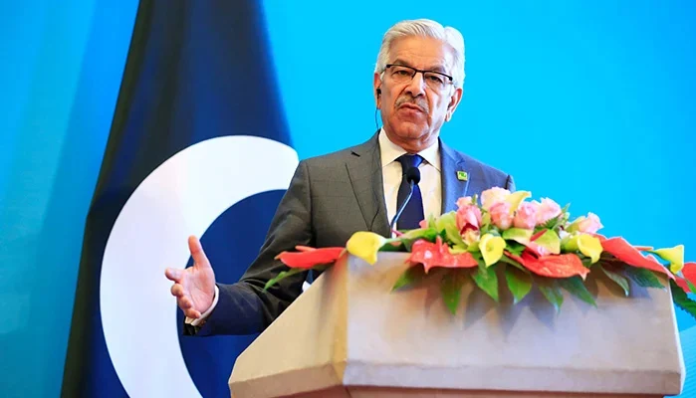BEIJING, APR 25 (DNA): Defence Minister Khawaja Asif has drawn the international community ‘s attention towards the growing tensions between India and Pakistan, saying that the world should be “worried” about the potential for a full-scale conflict between the two nuclear-armed nations.
The minister warned that tensions with India over a deadly shooting in the Indian Illegally Occupied Jammu and Kashmir (IOJK) could escalate into an “all-out war”, in an interview with British Sky News.
The warning follows the deadly gun attack in the IIOJK, where 26 tourists were shot dead at a scenic location in the Pahalgam area. The victims included one Nepali national.
India’s government has blamed Pakistan for the attack, a claim that Islamabad vehemently denied and also termed as a “false flag operation”.
Asif stressed that Pakistan’s military was “prepared for any eventuality” amid growing diplomatic tensions. “We will measure our response to whatever is initiated by India. It would be a measured response,” he said. “If there is an all-out attack or something like that, then obviously there will be an all-out war.”
However, he expressed hope that the situation could still be resolved through negotiations.
When asked whether the global community should be concerned, the defence minister responded in affirmative. “The clash between two nuclear powers is always worrisome… If things get wrong, there could be a tragic outcome of this confrontation.”
Meanwhile, Indian Prime Minister Narendra Modi has vowed to pursue those behind the attack “to the ends of the Earth.”
When asked whether he blamed India for the shooting, Asif said: “Yeah, absolutely. They create these situations.” Despite the rising tensions, he added: “We should be solving our problems through negotiations.”
Earlier, Asif said that Pakistan has absolutely nothing to do with it, as Pakistan rejects terrorism in all its forms and everywhere. He said that India should investigate the Pahalgam incident as merely levelling allegations won’t absolve them of responsibility.
In a blatant response to the Pahalgam attack, India announced the unilateral decision to suspend the six-decade-old Indus Water Treaty and also taking other steps against Pakistan in the aftermath of an attack on tourists in the occupied territory.
To counter India’s controversial measures taken by the government in New Delhi, the National Security Committee (NSC) warned that any move by India to divert the flow of water lawfully belonging to Pakistan will be “considered an act of war”.
The NSC convened on Thursday warned: “Any attempt to stop or divert the flow of water belonging to Pakistan as per the Indus Waters Treaty, and the usurpation of the rights of lower riparian will be considered as an act of war and responded with full force across the complete spectrum of national power.”
Pakistan decided to close all Indian land transit via Wagah Border, closed its airspace for all commercial Indian aerial traffic and capped the Indian High Commission’s staff to 30 persons among other key decisions.
Responding to the evolving situation betwee the two nuclear armed countries, the United States has said that it is closely monitoring the “horrible” situation in the Asian subcontinent.

















